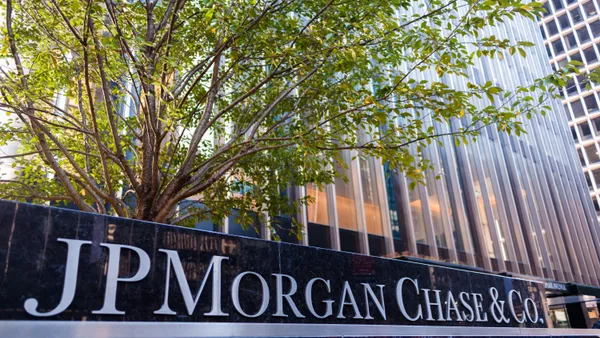Dive Brief:
- Mobile payment service Venmo will partner with Synchrony Financial to launch a credit card in the second half of 2020, Venmo's parent company, PayPal, announced in a press release Thursday.
- The deal deepens PayPal's 15-year relationship with Synchrony and allows the bank to diversify outside the retail sphere. Synchrony has co-branded credit cards with Amazon, Lowe's, Banana Republic and JCPenney. But it lost its most valuable partnership last year when Walmart chose to issue its latest cards through Capital One.
- Users will be able to pay bills directly through the Venmo app. They can also opt to share payment history on their social feed, split purchases with other people, and get real-time alerts to monitor card activity, according to MarketWatch. But many details of the Venmo card's offerings, such as rewards and cash back, have yet to be ironed out, PayPal said.
Dive Insight:
Venmo is just the latest tech company to expand into credit cards as a new way to boost profits and engage users. Apple, Goldman Sachs and Mastercard debuted the Apple Card in August. In a conference call Tuesday, Goldman Sachs CEO David Solomon called the rollout "the most successful credit card launch ever," citing high consumer demand, according to CNBC.
Venmo has been evolving beyond peer-to-peer payments in recent years, announcing a debit card last year and a "Pay with Venmo" feature for online purchases.
"The next natural extension was to have a Venmo credit card," Darrell Esch, senior vice president of credit at PayPal, told CNBC. "This rounds out what was otherwise a gap with the debit card."
Venmo adds a quickly expanding business to Synchrony's profile. PayPal CEO Dan Schulman said in April that Venmo had 40 million users and reported 73% year-over-year growth.
"This is going to a big partnership for us — we know that Venmo is a growing customer base," Synchrony CEO Margaret Keane told CNBC. "This sets us up as a company that can demonstrate digital savviness and innovation and at the same time, leverage things we've done in the past, like managing the relationship with a partnership and building out great analytics."
The past 12 months have been challenging at times for Synchrony. Walmart sued the bank for $800 million in damages in November over its co-branded credit card, alleging Synchrony underwrote the retailer’s $8 billion portfolio in a way that exposed the program to significant credit risk. Synchrony, in turn, accused the retailer of promoting the program insufficiently. Walmart dropped the suit.













